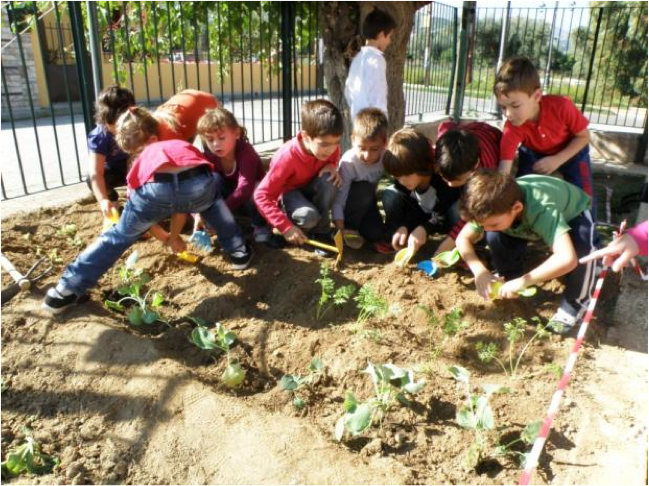School vegetable gardens
May 28, 2013
Contributor: Athens
Workshop:
Governance, synergies and local systems / Final consumers -Youngsters
Social inclusion, job creation, economics / Eating more sustainably within a limited budget – Involving various population groups in sustainable food transition
Resource efficiency – CO2 reduction / What key behavioural changes to promote to effectively lessen footprint?
School vegetable gardens offer the opportunity to youngsters to get acquainted with their food and learn about sustainable agriculture and consumption.

School vegetable gardens form an activity implemented by the municipality for the first time in 2012. As a pilot 30 primary and secondary schools have adopted the program, while in the past two months the project was announced to all schools willing to make a small garden. The project is run in cooperation with the Ministry of Education Environmental Education Secretariat and the responsible teachers at every school.
The initial motivations came from many directions. On the one hand there were no gardens or green areas in most schools in Athens. At the same time the food offered in school canteens is mostly ready made food lacking in fruits and vegetables, while students and teachers in the city center are alienated from nature. All the above and the fact that school gardens were succesfully implemented in other municipalities has made it clear that vegetble school gardens are a necessary measure for ameliorating food culture in Athens.
The main target is the creation of small vegetable gardens in order to:
- Enhance students relation to nature, since such a relation ameliorates their physical, psychologiacal and emoitional health.
- Promote the adoption of healthier nutrition.
- Offer a context wherein students learn to cooperate and to accept their individual responsibility in collective actions.
- Help students to acquire new abilities.
- Enrich school activities regarding a range of taught courses, as well as environmental education.
- Form close ties among all participants in the academic and school communities.
- Offer the potential for alternative teaching methods that are proven more effective in cases of cognitive difficulties.
Until now the project was welcome with great enthousiasm from the schools that created the vegetable gardens, while many other schools in the municipality have asked for the extension of the gardens to all public education institutions. At the same time it is expected that in the longterm, students, teachers and parents eventually shall become aware of sustainable food practices ranging from production to consumption.
Judging from the school community reactions the most immediate benefit is the creation of a common attitude among all interested parties with regards to the importance of food and the way it is produced.
Pro:
- The popularity and spread of the vegetable garden project.
- The emergence of a collective consciousness, coming from students and teachers alike, with regards to the importance of such gardens.
- The possibility for students to get immediately acquainted with nature without having to travel outside Athens.
Contra:
- The absence of soil and green spaces in schools can become a barrier to the action. However the use of raised beds has solved the problem.
- The cost involved in providing raised beds and soil.
For a city like Athens with limited green space, this project may function as a good pilot for any city wishing to establish a similar scheme.